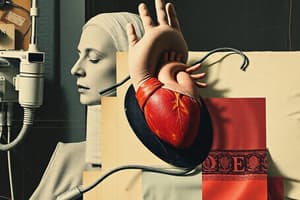Podcast
Questions and Answers
What is the primary purpose of ECMO?
What is the primary purpose of ECMO?
- Providing prolonged cardiac and respiratory support (correct)
- Removing artificial oxygenation of red blood cells
- Treating underlying causes of cardiac arrest
- Supporting native circulation
What is the device used in ECMO known as?
What is the device used in ECMO known as?
- Respiratory assist device
- Cardiopulmonary bypass machine
- Artificial heart
- Membrane oxygenator (correct)
When is ECMO generally used in the treatment process?
When is ECMO generally used in the treatment process?
- As the primary treatment for heart and lung failure
- Only in the early stages of heart failure
- Post-cardiopulmonary bypass or in late-stage treatment of heart and/or lung failure (correct)
- Exclusively for treating cardiac arrest
How does ECMO work?
How does ECMO work?
What is the source of technology for ECMO?
What is the source of technology for ECMO?
What are initial symptoms of shock?
What are initial symptoms of shock?
What is another name for low volume shock?
What is another name for low volume shock?
What may cause obstructive shock?
What may cause obstructive shock?
How is the diagnosis of shock generally made?
How is the diagnosis of shock generally made?
What may distributive shock be due to?
What may distributive shock be due to?
Flashcards are hidden until you start studying
Study Notes
ECMO Basics
- The primary purpose of ECMO (Extracorporeal Membrane Oxygenation) is to provide both cardiac and respiratory support to patients who are experiencing cardiac or respiratory failure.
ECMO Device
- The device used in ECMO is known as a membrane oxygenator.
ECMO Usage
- ECMO is generally used in the treatment process when other life-supporting therapies are inadequate, and it is usually used as a bridge to recovery or as a bridge to other therapies.
ECMO Mechanism
- ECMO works by draining the patient's blood, oxygenating it, and then returning it to the patient, thus providing cardiac and respiratory support.
ECMO Origins
- The source of technology for ECMO is derived from cardiopulmonary bypass technology used in open-heart surgery.
Shock Symptoms
- Initial symptoms of shock include low blood pressure, fast heart rate, and decreased urine output.
Low Volume Shock
- Another name for low volume shock is hypovolemic shock.
Obstructive Shock Causes
- Obstructive shock may be caused by a blockage or obstruction that prevents the heart from filling with blood, such as a pulmonary embolism or a tension pneumothorax.
Shock Diagnosis
- The diagnosis of shock is generally made by evaluating the patient's symptoms, medical history, and physical examination, as well as laboratory tests and imaging studies.
Distributive Shock Causes
- Distributive shock may be due to a disruption in the regulation of blood vessel tone, such as sepsis, anaphylaxis, or spinal cord injuries.
Studying That Suits You
Use AI to generate personalized quizzes and flashcards to suit your learning preferences.




